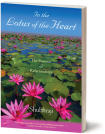
The Bhagavad Gita : Chapter EIGHT. [compiled by Kamini Khanna. Mombasa, Kenya. Africa
The Eighth chapter reveals the nature of the Lord in His different aspects – as Brahman, as Atman, as the creative power, as the world, as the universal Purusha (God) and as Jiva, the individual. Lord Krishna says that we attain the state for which we yearn at the time of our departure from this world. The goal we reach is determined by our beliefs, convictions and our faith. This chapter tells us of various actions that lead to the final experience of the Divine. Various paths and their final destinations are mentioned. Some lead directly to God and some take us to different lokas or planes.
Arjuna says: Krishna, what is Brahman, what is Adhyatma and what is Karma? Also, what is Adhibhuta and what is Adhidaiva? Oh Krishna, what is Adhiyajna here and how does it dwell in the body? How are YOU to be realized at the time of death by those of steadfast mind?
Sri Bhagavan said: The supreme Indestructible is Brahman; One’s own self (the Jivatma) is called Adhyatma; and the discharge of spirits (visaraga) which brings forth the existence of beings, is called Karma (Action). All perishable objects are Adhibhuta; the Purusha (Brahma or God) is Adhidaiva; and Arjuna, in this body I myself dwell as the inner witness, hence I am Adhiyajna.
He, who departs from the body at the time of death, thinking of Me alone, attains My state without any doubt. At the time of death, one is haunted by the thought of that object alone, which has mostly engaged his mind during his lifetime, and as a rule, it is the predominating thought of his last moment that determines his future destiny. Therefore Arjuna, think of Me at all times, and fight. With your mind and reason thus surrender to me. You will doubtless come to me. He who with his mind established in Yoga in the form of practice of meditation, and thinking of nothing else, is constantly engaged in contemplation of God, attains the supreme divine Purusha (God).
Sri Krishna states, that at the moment of one’s death, one should possess a calm mind filled with thoughts of God, as well as a satisfaction of having lived a life of duty, values and prayers. One should not let one’s attention run to what is being left behind. One’s attention should abide within oneself. This kind of peaceful parting without resistance, paves the way towards reaching the Lord – who is the source of ‘EVERYTHING.’ It is not merely at the precise moment of death that one should be like this. In fact, the entire life should be spent in this manner.
Sri Krishna further explains that one should avoid resisting or delaying one’s death. He advises that at the time of death, one should not look back nostalgically at what one is leaving behind. One should focus one’s faculties within oneself. One should be in yoga, which means, relative mental peace, and then allow death to occur on its own. In a manner similar to relaxing physically and mentally to allow sleep to come well, we should relax to permit death, no different from sleep, to take place. We do not fear sleep; hence we should not fear death. The Lord is democratic and kind. He gives us different options. We have the freedom to choose between the path of the good and the path of the pleasant, the dark path or the light path, uttarayana or the dakshinayana and so on. Some follow the path of sakama karma or actions with selfish desires. On their death, they go to the svargaloka or heaven to enjoy the fruits of their meritorious actions and then return to the earth again. Some take the path of upasana, and reach Him through kramah mukti (liberation in due course) Yet others who constantly remember Him, attain His abode directly.
The Lord promises, “Just by remembering Me constantly, you can attain Me.” Those who leave the body with ‘Om’ in their mind, they gain the Lord. This chapter is like the stomach. What we eat determines the kind of nourishment we get. In other words, we reap the fruit of our actions. The different kinds of fruit of our actions: If we eat good food, we become healthy: if we eat junk food, we fall ill.
Chapter 8 is the stomach of the Lord. We attain the state that we aspire for. The state of mind depends on what we feed it with. One who feeds on the nectar of the Lord’s name, gains immortality.
“A deep, wise, and wonderful exploration of the Vedanta path for relationships both with yourself and with others. Shubhraji provides everything you need to create healthy, fulfilling relationships…”
Order Now